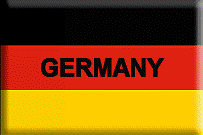Legislators commit to German stimulus package
 Berlin - Germany's 12-billion-euro (15-billion-dollar) economic-stimulus package, which has wobbled in the past few days, won approval from almost all pro-government legislators Thursday.
Berlin - Germany's 12-billion-euro (15-billion-dollar) economic-stimulus package, which has wobbled in the past few days, won approval from almost all pro-government legislators Thursday.
The two main parliamentary leaders, Volker Kauder of the Christian Democratic caucus and Peter Struck of the Social Democrats, said they would see to it that the legislation was adopted by parliament by the end of the month.
Joining other governments round the world, Chancellor Angela Merkel's government decided November 5 on a package that includes soft loans for medium-sized industry and for home insulation.
But her supporters began squabbling about a planned tax rebate for purchasers of new cars, saying it was not environmentally sound.
Merkel agreed this week to change the rules, and the Social Democratic caucus has now agreed to the package unanimously in a straw poll. Christian Democratic legislators said there was only one vote against in a show of hands when they met in Berlin.
One year of relief from motor vehicle tax is to be given to anyone buying a car between November 5, 2008 and the end of June 2009, and the government is to draft a vehicle-tax scheme in that period which favours cars with the lowest global-warming emissions.
The decision was taken the same day as the recession in Germany became official with the release of data showing the economy shrank for two quarters in succession.
Last month, legislators rushed through a package of 480 billion euros in aid to the German banking industry in less than a week.
The government says the pump-priming package for the wider economy will stimulate 50 billion euros in spending in Germany.
But the government's independent economic advisers suggested Wednesday that the package was too feeble and called for an additional package of government spending on roads and new schools.
General Motors (GM), the world's biggest carmaker, has also complained, asking instead for targeted aid for German car factories.
The multinational's German arm, Opel, asked Merkel for soft loans to German buyers of new cars and a government buy-in of elderly cars.
A Merkel spokesman rejected that earlier this week, and said European leaders would decide on whether the European Investment Bank (EIB) should offer a
40-billion-euro loan to carmakers. (dpa)